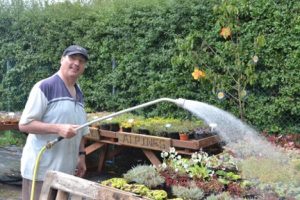
A work-like environment, in which people learn skills and engage in productive activities, brings important life benefits compared to the routines of ‘day activity’, argues Peter Green who runs Integrate’s social enterprises.
We all need something that occupies our time in a productive and stimulating manner – it is literally what gets us out of bed in the morning. In many cases the daytime offerings for people with learning disabilities can be poor, offering little variety and based on models which are well past their sell-by date.
Integrate in Preston, Lancashire has always endeavoured to buck this trend by providing meaningful daytime activities that are a little different: their social enterprises. From wood recycling, horticulture and a plant nursery, retail charity boutiques and product assembly packaging and fulfilment services as well as property maintenance, we aim to provide something a little different.
Since I arrived at the charity, nearly seven years ago, I have insisted that all of these pursuits must feel like a real work environment and the first step in achieving that is to make them operate in a business-like manner and be self-sufficient. This will guarantee their long-term viability and provide a focus to what we are setting out to accomplish.
Competent and professional
We help people develop distinct employment skills as well as general life skills. The benefits to well-being of work are well documented and we always see an increase in confidence, social skills and teamwork, as well as task-specific proficiency. We are businesses which means having to deal with other businesses and the general public in a competent and professional manner whilst offering exceptional value and a feel-good factor.
We have also found it helps if our teams can see the process from start to finish. For example, at our wood recycling service people get the chance to see everything, starting with the waste and surplus wood being collected from commercial construction sites. The next stage is the preparation and sorting of the wood by grade, through to point of sale, either ‘as is’ or converted into something the public want to buy, from the site. These three simple sounding stages offer a wealth of learning opportunities as well as reinforcing social and environmental responsibilities, whilst simultaneously breaking down the popular stereotype that disabled people who claim benefits are inherently lazy. This is not a word anyone has ever used to describe the people involved in this service.
We also link in with Runcorn College, not our most local but certainly the most willing, to offer occupational based qualifications. A three-year rolling programme offers access to work courses to NVQs and everything inbetween, again reinforcing parity with any other workforce.
Common goal
Our staff nights out are inclusive, the banter over lunch is real and a great sense of camaraderie exists at all the enterprises. In many cases the benefits of being part of a team all working together to achieve a common goal, and the kinship this fosters, is a more important outcome than the task itself.
Integrate’s social enterprises have also been recognised through industry award schemes, winning many accolades at both a national and regional level. The main regional awards are the annual Enterprise in Society awards and we have noticed a real change over the six years we have attended. The first year we were the only organisation to send a delegation that included those we support as well as paid staff and volunteers – we didn’t have to make a conscious choice about that as it is in our DNA. At this year’s awards it was nice to see that it is now the norm for this to be the case.
For myself all this is not without its challenges. I am a qualified nurse by profession and hold senior operational management responsibility for a large and diverse range of supported housing in addition to the social enterprises. I find myself having to know as much about DEFRA regulations, commercial vehicle deployment and chainsaw qualifications, and a whole host of obscure details in order to allow the businesses to operate. On the plus side, there is never a dull moment and the effect we have on an individual and community level is its own reward.
Integrate’s Social Enterprises
- Pak – product assembly, packaging and fulfilment service
- Integrate shop – charity retail service
- Plants+ – horticultural business with plant nursery, traditional crafts and contract work
- The Woodhouse – furniture renovation, handyman service, waste and surplus wood converted into furniture and other products.
All enterprises are sustained through trading income.
Peter Green is Project Director at Integrate (Preston & Chorley) Ltd
http://www.integratepreston.org.uk/
For further information about the enterprises see:
http://www.integratepreston.org.uk/integrate-community-enterprises.asp
